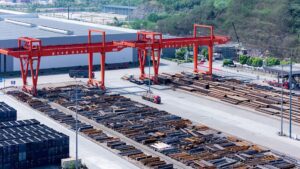Understanding the Current State of U.S.-China Trade Relations: Insights from the Extreme Investor Network
As global investors, staying informed about geopolitical developments is crucial for making sound investment decisions. One pivotal area to watch is the evolving trade relationship between the U.S. and China, two of the world’s largest economies. Recent statements from Chinese officials highlight the current tense atmosphere and indicate that dialogue may not be as imminent as some have hoped.
No Ongoing Negotiations
On April 20, 2025, China made it explicitly clear that there are no active negotiations with the U.S. regarding tariffs, despite earlier indications from the White House suggesting a possible easing of tensions. Chinese Ministry of Commerce Spokesperson He Yadong strongly asserted that any claims of progress in trade discussions should be disregarded.
This lack of communication is significant for investors, as it signals that any anticipated resolutions or agreements could be far off. The Chinese stance emphasizes their willingness to engage in discussions but only if treated as equals—a crucial catchphrase that reflects their demand for respect in international dealings.
The Impact of Tariffs
Earlier this month, the U.S. imposed a staggering 145% tariff on a range of Chinese goods, prompting Beijing to react with its own set of duties along with heightened export restrictions on critical minerals to the U.S. This escalating cycle of tariffs is not just a matter of political rhetoric; it has real consequences for businesses and investors alike.
Investors should understand that tariffs typically lead to increased costs for consumers and businesses, potentially triggering inflationary pressures. Higher tariffs on Chinese goods could shift sourcing strategies for American companies, resulting in increased operational costs that may erode profit margins.
The Role of Commodities
For those invested in commodities, particularly steel and other industrial metals, the currently tense trade relationship can lead to volatility in pricing. Increased tariffs can restrict import flows and create localized supply constraints, thereby affecting market prices. Steel, as highlighted by the inventory situation at Guoyuan Port in Chongqing, China, plays a vital role in infrastructure and construction; understanding these dynamics can guide better investment and trading decisions.
The Investor’s Perspective
In times of economic uncertainty, it’s essential for investors to remain vigilant about international developments. The trade tensions between the U.S. and China exemplify how geopolitical factors can influence economic landscapes. At Extreme Investor Network, we believe that a well-informed investor is a successful investor.
Investing in global markets requires foresight and flexibility. Here are some strategies to navigate this complex environment:
-
Diversification: Don’t put all your eggs in one basket. Spread your investments across various sectors and geographic regions to cushion against localized downturns.
-
Stay Informed: Keep up with the latest news and analyses from reliable sources. Understanding the economic implications of trade relations can give you a critical edge.
-
Leverage Technology: Utilize analytics tools to monitor market trends and adjust your investment strategy in real time. Knowledge is power in trading.
- Engage with Experts: Participate in forums and groups such as Extreme Investor Network, where insights and strategies are shared among a community of informed investors.
Conclusion
The current impasse in U.S.-China trade negotiations underscores the importance of awareness and adaptability in investment strategy. As the situation unfolds, the implications for global markets are substantial. By engaging with platforms like Extreme Investor Network, investors can access tailored insights and leverage collective knowledge to navigate this challenging landscape effectively. Stay tuned for ongoing updates as we continue to monitor this critical situation.

